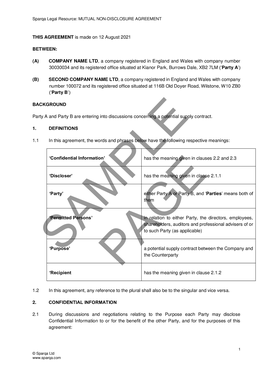 A properly drafted non-disclosure agreement is legally binding. It must be signed correctly by the person you are meeting or negotiating with, and make clear what confidential information is protected.
A properly drafted non-disclosure agreement is legally binding. It must be signed correctly by the person you are meeting or negotiating with, and make clear what confidential information is protected.
However, legal proceedings to enforce NDAs are relatively unusual as they are time-consuming and expensive . For this reason, even if you have an NDA in place, you should still be cautious about disclosing any particularly sensitive or confidential information to third parties.
NDAs – the basics
A non-disclosure agreement (NDA) is a legal agreement to prevent the misuse of confidential or sensitive information. You should consider using an NDA in any situation where you are planning to disclose information on your business to a third party, and it should be signed at the early stages of discussions.
If someone to whom you plan to disclose information on your business signs an NDA, that person will typically agree :
- to keep the information you disclose confidential;
- only to use the information for the purposes for which it was disclosed and not for any other purpose;
- not to disclose the information to anyone else unless specifically allowed to do so under the NDA; and
- at your request to return to you or destroy any information handed over.
You can find template NDAs at NDA (mutual) and NDA (one way). You can also purchase these templates as part of the Protecting IP and confidential information toolkit.
Types of information NDAs can protect
The purpose of an NDA is to protect business information you disclose in the course of a business meeting or negotiation.
In particular, you should be looking to protect the following information:
- intellectual property which you have not registered (although even for intellectual property you have registered, the use of an NDA will make the other party aware they are under an obligation to keep it confidential);
- information on inventions which you have not patented;
- other information which is confidential or sensitive such as your business plan, know-how, financial information and customer and supplier lists; and
- details of the discussions between you and the person receiving information from you.
Information typically excluded from protection under a well drafted NDA includes:
- information which is already available to the public; or
- information which was legally in the recipient’s possession before being disclosed.
Is a non-disclosure agreement legally binding?
Yes, a correctly executed non-disclosure agreement is legally binding, and requires the parties to the agreement to keep the relevant information they receive confidential.
Key benefits of NDAs include the following:
- setting out clearly the way in which any third party should use the information you provide them with;
- operating as a deterrent to discourage misuse by the person who receives your information;
- if the recipient misuses your information in breach of the NDA you will normally have a legal claim against them;
- a signed NDA makes it easier to bring a legal claim if the recipient misuses your information; and
- a signed NDA (particularly a mutual one ) can help to establish a mutual bond of trust between you and any person with whom you are sharing information.
What to do if someone refuses to sign an NDA
Whether someone to whom you plan to disclose information at a meeting or during negotiations will agree to sign an NDA depends on the particular circumstances of your meeting or negotiations and whom you are dealing with. Some businesses will refuse to sign an NDA, or will prefer to deal with someone who does not require one.
You will need to balance the potential benefits to your business of disclosing information against the risks of not having an NDA in place . You may decide that it is too big a risk without an NDA in place and not proceed any further with discussions. Alternatively , you may decide to go ahead with the meeting or negotiation but perhaps hold back some of the more sensitive information until you are comfortable with the person you are dealing with.
Getting an NDA signed retrospectively
It is possible to arrange for an NDA to be signed retrospectively (after you have already provided the confidential information) but this is not recommended. If the person to whom you have disclosed information refuses to sign the NDA, it will be more difficult for you to pursue that person for misusing the information, and even if they do sign it may be more difficult to enforce the NDA, in particular regarding the information you have already disclosed.
The content in this article is up to date at the date of publishing. The information provided is intended only for information purposes, and is not for the purpose of providing legal advice. Sparqa Legal’s Terms of Use apply.

Marion joined Sparqa Legal as a Senior Legal Editor in 2018. She previously worked as a corporate/commercial lawyer for five years at one of New Zealand’s leading law firms, Kensington Swan (now Dentons Kensington Swan), and as an in-house legal consultant for a UK tech company. Marion regularly writes for Sparqa’s blog, contributing across its commercial, IP and health and safety law content.






